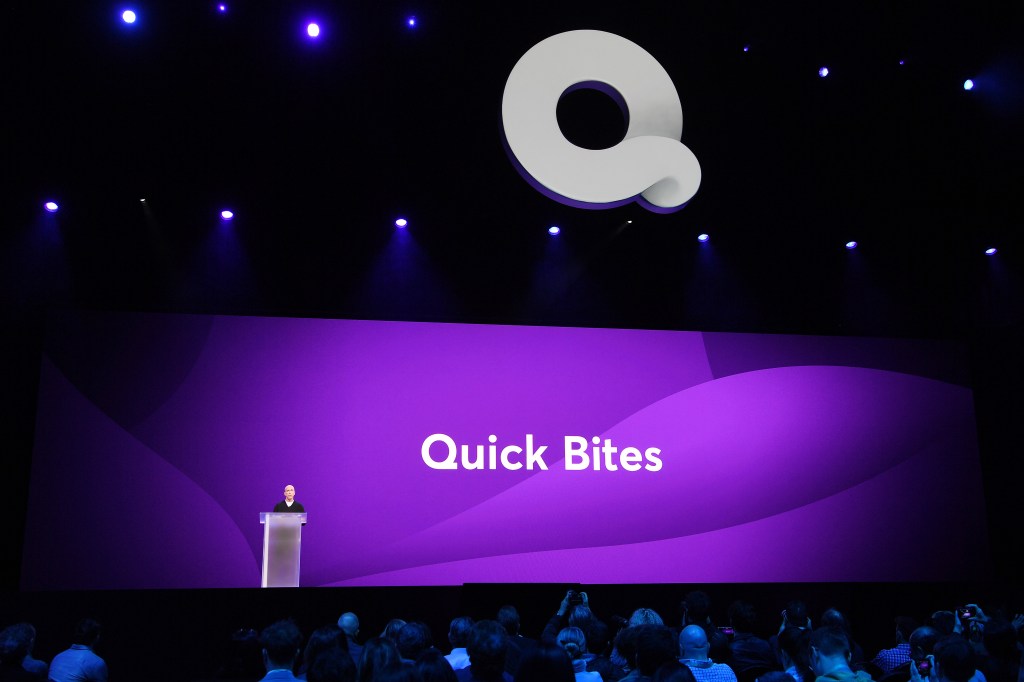Editor’s note: Get this free weekly recap of TechCrunch news that any startup can use by email every Saturday morning (7 a.m. PT). Subscribe here.
Startup failure is easy to hold up as a type of martyrdom for progress, especially if the founders are starting out scrappy in the first place and trying to save the world. But heroic narrative gets complicated when the startup failure involves the biggest names in entertainment, dubious product decisions, and well over $1 billion in losses in an already very competitive consumer tech subcategory.
I was going to skip any mention of Quibi because, like me, you have heard more than enough already. But this week its shutdown announcement turned into a debate on Twitter about the nature of startup failure and whether this was still the right kind. Many in the startup world said it was still good, basically because most any ambitious startup effort leads to progress. Danny Crichton, in turn, argues that the negativity was fully justified in this case.
Let’s be honest: Most startups fail. Most ideas turn out wrong. Most entrepreneurs are never going to make it. That doesn’t mean no one should build a startup, or pursue their passions and dreams. When success happens, we like to talk about it, report on it and try to explain why it happens — because ultimately, more entrepreneurial success is good for all of us and helps to drive progress in our world.
But let’s also be clear that there are bad ideas, and then there are flagrantly bad ideas with billions in funding from smart people who otherwise should know better. Quibi wasn’t the spark of the proverbial college dropout with a passion for entertainment trying to invent a new format for mobile phones with ramen money from friends and family. Quibi was run by two of the most powerful and influential executives in the United States today, who raised more money for their project than other female founders have raised collectively this year.
Ouch. However, I think this still misses the bigger dynamic happening.
Quibi was so easy to criticize that it created an opportunity to plausibly defend for anyone who wants to show that they are here for the startups no matter how crazy. When you defend Quibi, you’re defending your own process, and making it clear to the next generation of startups that you’re personally not scared off from other people with crazy ideas and have the will to try even if the result is a big mess. Which is who founders want to hire in the early days, and who investors want to bet on.
I support both sides of this mass-signaling game. Analysts and journalists have provided a broad range of valuable insights about how Quibi was doing it wrong, that are no doubt being internalized by founders of all types. Meanwhile, Quibi defenders are no doubt sorting through their inbound admirers for great new deals. All in all, Quibi and the debate around it might ultimately make future companies a little better. Which is what we all wanted in the first place, right?

Root Insurance plans pricing as Datto goes public
The IPO market has not shut down (yet) for election turmoil and whatnot. First up, managed service provider Datto went out on Wednesday and has inched up since then — a strong outcome for the company and its private equity owner, even if third parties did not benefit from an additional pop. A few more notes from Alex Wilhelm:
Datto’s CEO Tim Weller told TechCrunch in a call that the company will still be well-capitalized after the public offering, saying that it will have a very strong cash position.
The company should have places to deploy its remaining cash. In its S-1 filings, Datto highlighted a COVID-19 tailwind stemming from companies accelerating their digital transformation efforts. TechCrunch asked the company’s CEO whether there was an international component to that story, and whether digital transformation efforts are accelerating globally and not merely domestically. In a good omen for startups not based in the United States, the executive said that they were.
Next to market, Root Insurance released its stock pricing set this week, raising the goal to a valuation above $6 billion. It’s definitely on track to be Ohio’s biggest tech IPO to date. Here’s Alex again, with a comparison against Lemonade, another recently IPOed insurance tech provider for Extra Crunch:
[I]t appears that Root at around $6 billion is cheap compared to Lemonade’s pricing today. So, if you’d like to anticipate that Root raises its IPO price range to bring it closer to the multiples that Lemonade enjoys, feel free as you are probably not wrong. Are we saying that Root will double its valuation to match Lemonade’s current metrics? No. But closing the gap a bit? Sure.
For insurtech startups, even Root’s current pricing is strong. Recall that Root was worth $3.65 billion just last August. At $6.34 billion, the company has appreciated massively in just the last year and change. A small repricing could boost Root’s valuation differential to a flat 100% rather easily.
So, for MetroMile and ClearCover and the rest of the related players, do enjoy these good times as long as they last….

AR/VR is coming (sooner than expected)
A year ago, the market looked quite young. But now, the pandemic has made the value of augmented and virtual reality clearer to the world. Lucas Matney, who has been covering the topic here for years, just conducted a survey of seven top investors in the space. While they mostly continue to see the vertical as a bit early, they see it getting relevant fast. Here’s one key response, from Brianne Kimmel of Work Life Ventures, on Extra Crunch:
Most investors I chat with seem to be long-term bullish on AR, but are reticent to invest in an explicitly AR-focused startup today. What do you want to see before you make a play here?
I think it all comes down to a unique insight and a competitive advantage when it comes to distribution. And so, I’ll use these new [Zoom] apps as an example, I think that they’re a great example where there are certain aspects of roles and certain highly specialized skills where teaching educating and doing your daily job on Zoom won’t actually cut it. I do foresee AR applications becoming an integral part of certain types of work. I also think that now that as a lot of the larger platforms such as Zoom are more open, people will start building on the platforms and there will be AR-specific use cases that can help industries where, you know, a traditional video conferencing experience doesn’t quite cut it.

Zurich startup scene loaded with talent
In other survey news, Mike Butcher continues his (sadly virtual) tour across European startup hubs for EC, this week checking in with investors in Zurich, Switzerland. Here’s a tidy explanation of the city and country’s deep technical experience, from Michael Blank of investiere:
Which industries in your city and region seem well-positioned to thrive, or not, long term? What are companies you are excited about (your portfolio or not), which founders?
Switzerland has always been at the forefront of technological innovation in areas such as precision engineering or life sciences. We strongly believe that Switzerland will also thrive in the long run in those areas. Thinking for example about additive manufacturing startups such as 9T Labs or Scrona, drone companies such as Verity or Wingtra or health tech startups such as Aktiia or Versantis.
Brussels investors, Mike is headed your way next. You can reach him here.
Around TechCrunch
Announcing the agenda for TC Sessions: Space 2020
Rocket Lab’s Peter Beck is coming to TC Sessions: Space 2020
Extra Crunch Partner Perk: Get 6 months free of Zendesk Support and Sales CRM
Across the week
TechCrunch
Equity Monday: Three neat venture rounds, and Alibaba’s latest
The smart speaker market is expected to grow 21% next year
Financial institutions can support COVID-19 crowdfunding campaigns
Ready Set Raise, an accelerator for women built by women, announces third class
Extra Crunch
Here’s how fast a few dozen startups grew in Q3 2020
Late-stage deals made Q3 2020 a standout VC quarter for US-based startups
Founders don’t need to be full-time to start raising venture capital
Three views on the future of media startups
Dear Sophie: What visa options exist for a grad co-founding a startup?
#EquityPod
Hello and welcome back to Equity, TechCrunch’s venture capital-focused podcast (now on Twitter!), where we unpack the numbers behind the headlines.
Myself, along with Danny and Natasha had a lot to get through, and more to say than expected. A big thanks to Chris for cutting the show down to size.
Now, what did we get to? Aside from a little of everything, we ran through:
- The fall of Quibi, and who lost money in the mix. TechCrunch has a bit more on the video service’s downfall here.
- The Netflix quarter, and why its shares lost ground after its report. The Quibi-Netflix stories show that it’s not smooth sailing in the market for online video.
- If Netflix stumbled, Snap soared with stronger-than-expected growth. The company still loses lots of money, but it’s getting closer to reasonable results, and has lots of cash.
- Then we turned to a few media startups that raised, including $4 million for Stir and $2.5 million for Quake. Quake the podcasting company, mind, not the excellent FPS.
- Next was a handful of housing rounds, including the very neat Abodu and the somewhat controversial RVshare, which split the three of us about whether or not it was going to work out.
- Then we had some great reporting from Natasha to parse through, including her piece on startup hacker houses, and her report on a new women-focused accelerator class.
Whew! It was a lot, but also very good fun. Look for clips on YouTube if you’d like, and we’ll chat you all next Monday.






























Comment